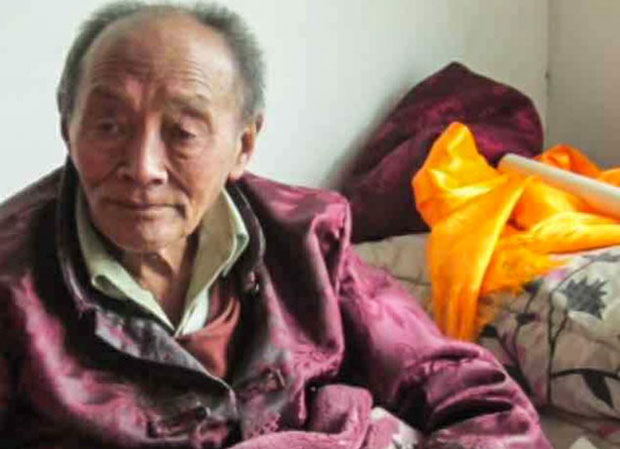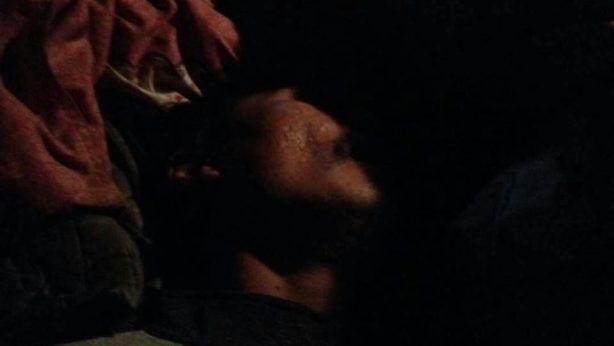Former Tibetan political prisoner subjected to 10 years house arrest dies

A former political prisoner died at the age of 84 after years of house arrest and poor health caused by injuries sustained during more than two years of detention in Chabcha (Ch: Gonghe) County, Tsolho (Ch: Hainan) Tibetan Autonomous Prefecture, Qinghai Province, in Tibet’s Amdo province.
Gyaye Phuntsok died last Monday at about 1 am local time after prolonged illness at his home in Gyaye Village in Chabcha. He was 68 when he was first detained in August 1998 by a group of Qinghai state security officers and armed police. In a subsequent raid at his home, the police seized a portrait of the Dalai Lama and a Tibetan history book. He was later charged with engaging in separatist activity and held in detention for two years. In 2000, when he was released, his health had deteriorated to the point that he was later confined to his bed for years until his death. One of the conditions for his release was that he will be put under house arrest for the next 10 years. In 2012, his health deteroriated further when he met with an accident. Efforts to seek treatments failed and his health did not improve.
Gyaye Phuntsok’s experiences are common to many known and unknown former political prisoners whose lives were permanently destroyed in detention. Tibetans are commonly subjected to prolonged incommunicado detention, subjected to beatings and torture, with increasing number of death in detention. Many die months or years after their release unable to recover from physical and psychological damages.
Gyaye Phuntsok was born in 1932 in Gyaye, Chabcha, Amdo. He received his education at Ditsa Monastery in Bayan (Ch: Hualong) County in Tsoshar (Ch: Haidong) Prefecture, Qinghai. In 1958 and during the Cultural Revolution, he was imprisoned and subjected to struggle sessions. Around 1980 he successfully reclaimed nomadic lands from the custody of the Chinese government after years of petitioning on behalf of the local nomads. In 1980 when Hu Yaobang, general secretary of the Chinese Communist Party visited Tsolho area, it was Gyaye who briefed the Chinese leader on the actual conditions in his hometown.
He initiated many projects to make education accessible to children living in remote, nomadic areas by founding in 1981 the Gyaye school in his hometown in Gyaye, where hundreds of children have benefited. In 1987, he submitted a number of petitions calling on the authorities to remove a nuclear power plant named ‘Base 151’ near Qinghai Lake. In 1988, he bacame the first principal of a Tibetan Middle School that was opened near Qinghai Lake. In 1992, he visited India on a pilgrimage during which he sought blessings from the Tibetan spiritual leader Dalai Lama and received gelong (monk) vows. On his return to Tibet, he built stupas and temples, and initiated many projects aimed at promoting Tibetan language education in Amdo area.
TCHRD is unable to obtain more information on Gyaye Phuntsok’s 10-year ‘house arrest’ which he was subjected to after his release. In Chinese law, there are two types of ‘house arrest’ or ‘residential surveillance‘ : one that is enforced at the residence of the suspect, or at a place chosen by the law enforcement agencies. Article 73 of the Criminal Procedure Law stipulates: “Where, for a crime suspected to endanger State security, a crime involving terrorist activities and a crime involving a significant amount of bribes, residential surveillance at the domicile of the criminal suspect or defendant may impede the investigation, it may…be enforced at a designated place of residence.” The amended Chinese Criminal Procedure Law contains additional provisions on residential surveillance allowing the authorities to impose “electronic monitoring, irregular inspections, and other surveillance measures” on persons under residential surveillance. Residential surveillance also requires the suspect to surrender their passports or similar documents, identification documents, and driver’s licenses.


